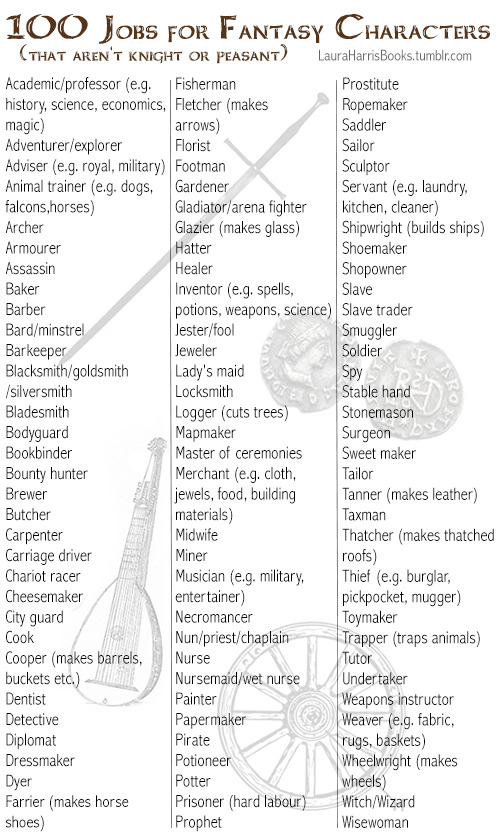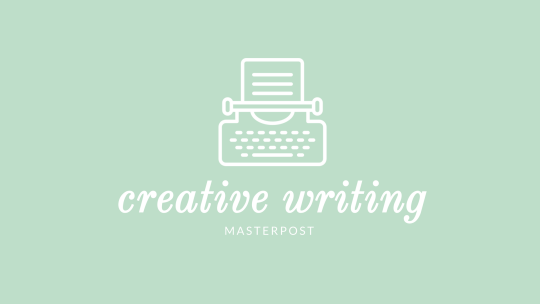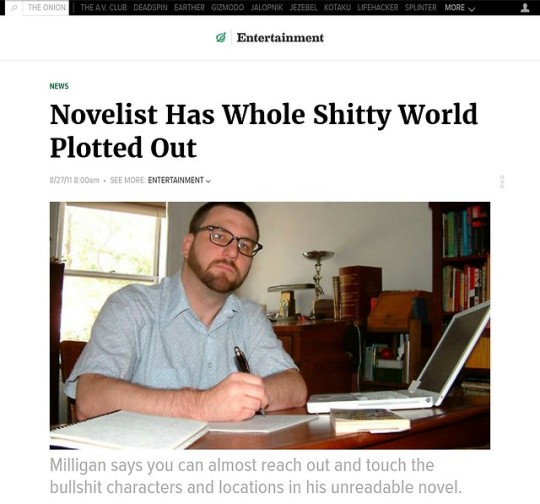Writeblr with a focus on SF/F. Resources, prompts, and more. Doing NaNoWriMo 2019! I follow back @wormscientist.
Don't wanna be here? Send us removal request.
Text
I’ll reiterate what the comments are saying: these rules are for the purposes of workshop writing, NOT universal application. You don’t have to follow these rules. No one is telling you to. They are for the purpose of EXERCISE.
Exercises like this teach you the basics of craft, like drawing a figure or painting a still life. Sure, it’s not what you WANT to create, but it teaches you the skills you need to do the work.
If you don’t want to improve your writing, if you’re writing for yourself and yourself alone... fine. Cool. No one is forcing you to do anything. But if honing your skills is important to you, if you want to be able to write a sad scene that’s actually sad, that makes your readers FEEL and isn’t just your characters standing around moping and crying, then you have to put in the damn work.
5 frustrating workshop rules that made me a better writer
Throughout the 15 workshops I joined in college and grad school, I encountered two types of writing rules.
First, there were the best-practice guidelines we’ve all heard, like “show don’t tell.” And then there were workshop rules, which the professor put in place not because they’re universal, but because they help you grow within the context of the workshop.
My college’s intro writing course had 5 such rules:
No fantasy, supernatural, or sci-fi elements.
No guns.
No characters crying.
No conflict resolution through deus ex machina.
No deaths.
When I first saw the rules, I was baffled. They felt weirdly specific, and a bit unfair. But when our professor, Vinny, explained their purpose (and assured us he only wanted us to follow the rules during this intro workshop, not the others to come), I realized what I could learn from them.
1. No fantasy, supernatural, or sci-fi elements.
Writers need to be able to craft round characters, with clear arcs. While you can hone those skills writing any type of story, it can be more difficult when juggling fantastical elements, because it’s easy to get caught up in the world, or the magic, or the technology, and to make that the focus instead of the characters. So Vinny encouraged us to exclude such elements for the time being, to keep us fully focused on developing strong, dynamic characters.
2. No guns.
Weapons have a place in many stories, but when writers include a gun, they often use it to escalate the plot outside of the realm of personal experience and into what Vinny called “Hollywood experience.” He wanted us to learn how to draw from our own observations and perceptions of life, rather than the unrealistic action, violence, and drama we’d seen in movies, so he made this rule to keep us better grounded in our own experiences.
3. No characters crying.
When trying to depict sadness, writers often default to making characters cry. While there’s nothing inherently wrong with that, tears are just one way to show grief, and they aren’t always the most subtle or emotionally compelling. That’s why Vinny challenged us to find other ways to convey sadness — through little gestures, strained words, fragile interactions, and more. It was difficult, but opened us up to depicting whole new gradients of grief and pain.
4. No conflict resolution through deus ex machina.
This is the only one of the rules I’d say is generally universal. Meaning “God from the machine,” deus ex machina is a plot device where a character’s seemingly insurmountable problem is abruptly resolved by an outside force, rather than their own efforts. These endings are bad for various reasons, but Vinny discouraged them because he wanted us to understand how important it was for our characters to confront their struggle and its consequences.
5. No deaths.
Death is inherently dramatic and can be used to good effect, but many writers use death as a crutch to create drama and impact. Writers should be able to craft engaging, meaningful stories, even without killing off their characters, so this rule challenged us to find other methods of giving weight to our stories (such as through internal conflict).
How these rules helped me grow as a writer
First things first, I’ll say it again: apart from #4 (deus ex machina), these rules were never meant to be universally applied. Instead, their purpose was to create temporary barriers and challenges to help us develop key skills and write in new, unfamiliar ways.
For me, the experience was invaluable. I liked the way the rules challenged and stretched my abilities, driving me to write stories I’d have never otherwise attempted. They made me more flexible as a writer, and while I don’t follow the rules anymore (I LOVE me some fantasy), I’ll always be thankful for how they shaped my writing.
My recommendation to you?
Give some of these rules a shot! Follow them temporarily while writing 2-4 short stories — but remember to always keep their purpose in mind, because the rules themselves will only help if you understand what they’re trying to achieve.
Write with purpose, and you’ll always be growing.
— — —
For more tips on how to craft meaning, build character-driven plots, and grow as a writer, follow my blog.
11K notes
·
View notes
Text
My only real and valid writing tip is that you google every word you make up for your fantasy stories. That's It
188K notes
·
View notes
Text
Send me an OC name and I'll name:
Something really awesome they can do
A person, creature, or thing they adore
A secret they’re hiding
Something they truly fear
A fond memory of theirs
A place or item which gives them strong feelings
A dream or ambition for the future
An angsty fact about them
A domestic fact about them
A random other fact
95 notes
·
View notes
Text
WHY DID NO ONE TELL ME ABOUT PRO WRITING AID BEFORE?! THIS THING IS FUCKING GLORIOUS. HOLY SHIT. LOOK AT THIS.

IT GIVES YOU A WHOLE DAMN REPORT ON YOUR WRITING AND WALKS YOU THROUGH HOW TO MAKE IT BETTER AND WHY IT IS SUGGESTING CHANGES. THIS IS JUST A TINY CHUNK OF THE HUGE REPORT IT GAVE ME ON THE FIRST CHAPTER OF ONE OF MY PROJECTS. I AM IN LOVE.
AND IT WORKS WITH SCRIVENER. AND IT IS AFFORDABLE.
WHY DID NO ONE TELL ME?!
62K notes
·
View notes
Text
worldbuilding tips
populations and peoples don’t just suddenly change at a border marker. cultures interact and blend.
there are usually a multitude of cultures in one place, and religions often have different factions within them
what are the differences between the upper and lower classes? is there a lower class? what system is used? fuedalism? capitalism? communism?
how does your society view and deal with poverty?
think about the diaspora. invent a large population of immigrants. why are they there? how long have they lived there? how does their culture now differentiate from their homeland?
languages. is there a global lingua franca (a language that people use to speak internationally. historically this has been latin and french, and right now, english)? if so, why That One? are there smaller lingua francas within different nations?
a large country will almost always have smaller languages within it. put some in. you don’t even have to name them, just have someone mention that they often have to translate for their parents
the lingua franca will usually be the language of the majority, but not always. if a particular ethnic group has control of the government, and therefor education, then that language will probably become more widespread. although sometimes there are “official languages” and “daily languages”
i could write a whole other post about languages honestly
what things do different cultures see as beautiful? is it eyes? hair? what parts of the body are considered scandalous. are the bodies of men and women seen differently? how do people feel about breasts?
how is makeup used? is it daily? is it ceremonial? do different colours and patterns have meanings or is purely for aesthetic? is it seen as gendered?
basically just don’t take everything in your culture as the “norm.” there is no norm. the world is weird.
learn about other cultures in our own world. please.
23K notes
·
View notes
Text
O God, let me write with the authority and the panache of a self-assured male fantasy novelist with a very specific fetish
26K notes
·
View notes
Text
beautiful latin star adjectives
sidereus, -a, -um: starry; relating to stars; heavenly; star-like
stellatus, -a, -um: starry; set with stars; sparkling; glittering; shaped like a star or “X”
stellans, stellantis: starry; having the appearance of stars; set/adorned with stars
astrifer, -a, -um: starry; star-laden
constellatus, -a, -um: starry; studded with stars
stellifer, -a, -um: star-bearing; starry
11K notes
·
View notes
Text
“For The Plot,” I whisper, deleting a rad detail that no longer works as tears fall from my eyes
126K notes
·
View notes
Text
I want you to write for pleasure—to play. Just listen to the sounds and rhythms of the sentences you write and play with them, like a kid with a kazoo. This isn’t “free writing,” but it’s similar in that you’re relaxing control: you’re encouraging the words themselves—the sounds of them, the beats and echoes—to lead you on. For the moment, forget all the good advice that says good style is invisible, good art conceals art. Show off! Use the whole orchestra our wonderful language offers us! Write it for children, if that’s the way you can give yourself permission to do it. Write it for your ancestors. Use any narrating voice you like. If you’re familiar with a dialect or accent, use it instead of vanilla English. Be very noisy, or be hushed. Try to reproduce the action in the jerky or flowing movement of the words. Make what happens happen in the sounds of the words, the rhythms of the sentences. Have fun, cut loose, play around, repeat, invent, feel free.
Ursula K. Le Guin, Steering The Craft
28K notes
·
View notes
Photo





I read this study by @universityofbristol that used ai to model vision in different types of animals. It makes big cats a lot more terrifying. Deer and antelope like to hang out with birds, and the birds give warning calls when they spot a predator. From the deers perspective, the birds must have some psychic ability. Since deer can’t experience these colors, they probably can’t imagine that predators are a completely obvious color to other animals. There’s probably a lot of things that we cannot see, don’t have the words for, and don’t have the capacity to imagine, but they exist. Other places to see my posts: INSTAGRAM / FACEBOOK / ETSY / KICKSTARTER
51K notes
·
View notes
Photo

Irina Kravchenko by Damian Foxe for How To Spend It Magazine May 2019
897 notes
·
View notes
Photo

Beyond this, consider how these professions might vary depending on who the customers are - nobles, or lower class. Are they good at their job or just scraping by? Do they work with lots of other people or on their own? City or village?
For younger characters:
Apprentice to any of the above
Messenger/runner
Page/squire
Pickpocket
Shop assistant
Student
Looks after younger siblings
(Images all from Wikimedia Commons)
205K notes
·
View notes
Photo

Hey guys! As a writer myself, it’s hard to have a lot of resources for writing in one place. That’s why I decided to create this masterpost, and maybe make more if I find future resources. I hope you like it, and expect to see more masterposts like this in the future!
Generators
Character
Appearance Generator
Archetypes Generator
Character Generator
Character Traits Generator
Family Generator
Job/Occupation Generator, (II)
Love Interest Generator
Motive Generator
Name Generator
Personality Generator, (II)
Quick Character Generator
Super Powers Generator
Names
Brand Name Generator
Medicine Title Generator
Name Generator
Quick Name Generator
Vehicle Generator
Town Name Generator
Plot
First Encounter Generator
First Line Generator, (II)
Plot Generator, (II), (III)
Plot Device Generator
Plot Twist Generator
Quick Plot Generator
Setting/World-Building
City Generator
Fantasy Race Generator
Laws Generator
Pet Generator
Setting Generator
Species Generator
Terrain Generator
Prompts
Subject Generator
”Take Three Nouns” Generator
Word Prompt Generator
Misc
Color Generator
Decision Generator
Dialogue Generator
Journey Generator
Title Generator, (II), (III)
Some Tips
Just a few I found from the writing tips tag!
Writing action / @berrybird
How to create a strong voice in your writing / @collegerefs
How to plot a complex novel in one day! / @lizard-is-writing
8 ways to get past writer’s block / @kiramartinauthor
psa for writers / @dasakuryo
”Write Using Your 5 Senses” / @ambientwriting
How People Watching Improves Your Writing / @wherethetransthingsare
Writing Science Fiction: Tips for Beginners / @fictionwritingtips
Creating Likeable Characters / @authors-haven
Vocabulary
Descriptive words / @somekindofstudent
Words to replace “Said” / @msocasey
Obscure color words / @mintsteelpeachlilac
Words to spice up your stories / @busyibee
Words to describe someone’s voice
Words to Use Instead of Very / @gaybybirth
Touchy Feely Words / @gaybybirth
Some Advice
Stephen King’s Top 20 Rules for Writers
”But my plot isn’t UNIQUE or BIG enough!” / @youreallwrite
8 Things Every Creative Should Know / @adamjk
(How To) Get Over Comparing Yourself to Other Creatives / @adamjk
How to Get Over Common Creative Fears (Maybe) / @adamjk
14 Tips From Stephen King On Writing / @i-can-give-you-prompts
Playlists
Electronic Thoughts / @eruditekid
“Mix About Writing” An Instrumental Mix / @shadowofemirates
Shut Up, I’m Writing! / @ninadropdead
Chill / @endlessreveries
Breathtaking Film Scores / @tweedskirts
Music to Write to Vol. 1: Starlight / @crestadeen
Music for Written Words / @ghoulpatch
Dead Men Tell No Tales / @scamandersnewt
Fatale / @dolcegf
All These Things that I’ve Done / @referenceforwriters
Feeling Soaking into Your Bones / @verylondon
I Can Feel Your Pulse in the Pages / @rphelper
Morally Ambiguous / @scamandersnewt
Wonderwall / @wheelerwrites
Pythia / @mazikeene
Ballet: To Dance / @tanaquil
Websites and Apps
For Writing
ZenPen: A minimalist writing website to keep you free of distractions and in the flow.
The Most Dangerous Writing App: A website where you have to keep typing or all of your writing will be lost. It helps you keep writing…kind of. You can choose between a time or word count limit!
Evernote: An online website where you can take notes and save the product to your laptop and/or smartphone!
Writer, the Internet Typewriter: It’s just you and your writing, and you can save your product on the website if you create an account.
Wordcounter: A website to help check your word and character count, and shows words you’re using frequently.
Monospace: An Android app for writing on the go when you feel the inspiration, but you don’t have your laptop on you!
For Productivity
Tide: An app that combines a pomodoro-esque timer with nature sounds and other noises! (Google Play / Apple Store)
ClearFocus: An Android app with a pomodoro-type time counter to let you concentrate easier and stay productive.
Forest: An app with a time counter to keep you focused and off your phone, and when you complete the time limit, a tree grows in your garden! (Google Play / Apple Store)
SelfControl: A Mac downloadable app that blocks you from distracting mail servers, websites, and other things!
Prompt Blogs
@writeworld
@dialouge-prompts
@oopsprompts
@prompts-for-the-otp
@creativepromptsforwriting
@the-modern-typewriter
@theprofessionalpromptmaker
@writers-are-writers
@otp-imagines-cult
@witterprompts
@havetobememes
@auideas
@putthepromptsonpaper
@promptsonpaper
@fyotpprompts
@otpisms
@soprompt
@otpprompts
@ablockforwritersblock
@awritersnook
Writing Tips Blogs
@writeworld
@anomalously-written
@awritersnook
@clevergirlhelps
@referenceforwriters
@whataboutwriting
@thewritershelpers
@nimblesnotebook
@slitheringink
101K notes
·
View notes
Text
there is NO WAY to avoid tropes!! everything is a trope!! that doesn’t mean it’s bad!! embrace it!!
60K notes
·
View notes


